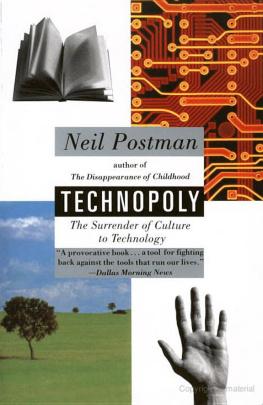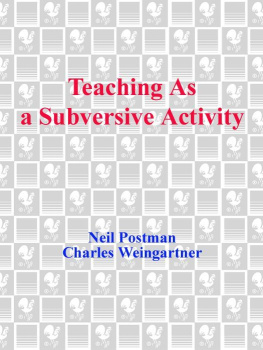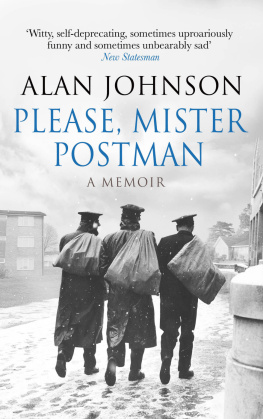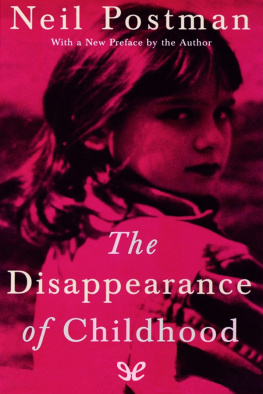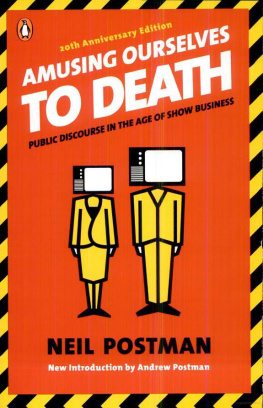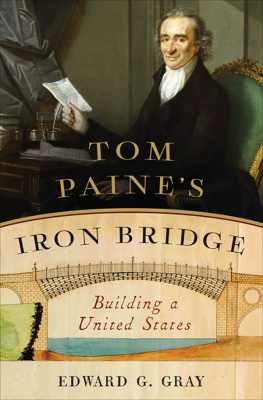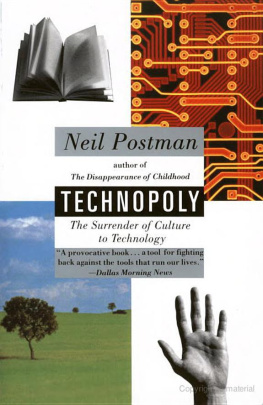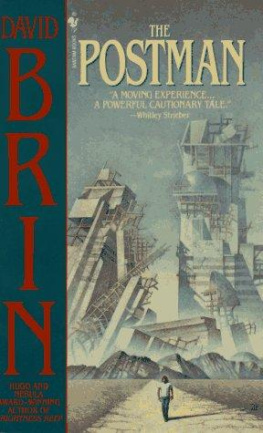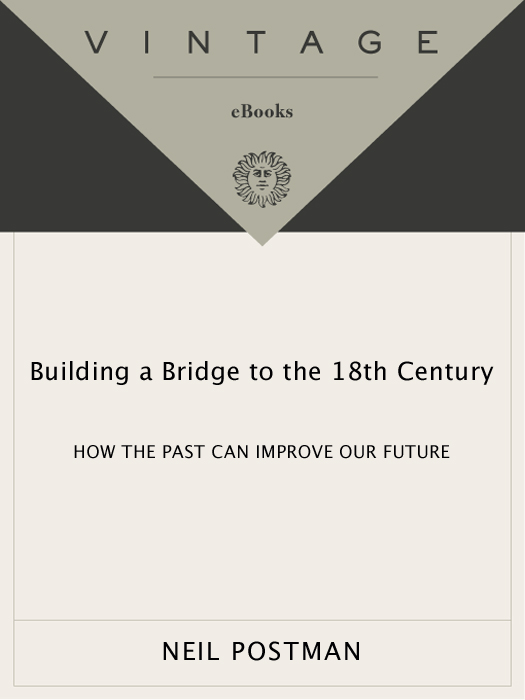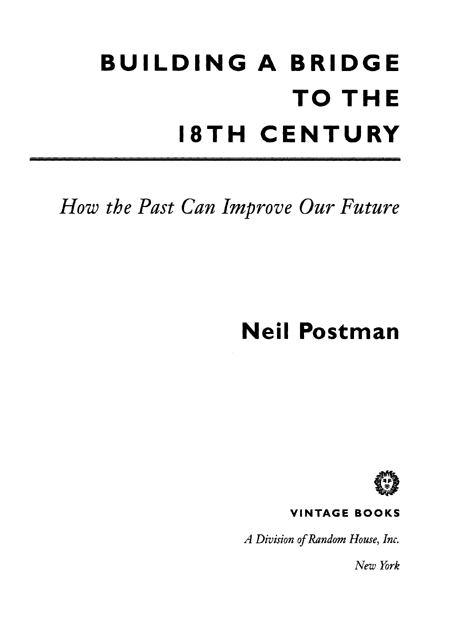Acclaim for Neil Postmans
BUILDING A BRIDGE TO THE 18TH CENTURY
Postmans brisk critique of contemporary trends and his urgent appeal for a common-sense skepticism make for compelling reading. His prose is witty and combative, lucid and self-revealing. One cannot help but admire his range of interests and his moral stamina.
Christian Science Monitor
A pithy and provocative defense of the Enlightenment tradition as a storehouse of still-relevant wisdom.
The News & Observer
Lucid and relevant. Important and meaningful. Postman writes well and with a flair that isnt always expected in nonfiction.
The Orlando Sentinel
Postman is a gifted writer who treats an important but complex subject with clarity and insight. For those who want to know where we came from in order to guide us to where we are going, this will be an extremely valuable book.
Booklist
An important voice for sane reflection about the direction of our society.
Sacramento News & Review
[A] penetrating, extended essay. Postman forcefully argues that we can use the complex legacy of the past to resist being swept into a shiny, simpleminded new dark age.
Publishers Weekly
ALSO BY NEIL POSTMAN
The End of Education
Technopoly
Conscientious Objections
Teaching as a Subversive Activity
(WITH CHARLES WEINGARTNER)
Crazy Talk, Stupid Talk
Teaching as a Conserving Activity
The Disappearence of Childhood
Amusing Ourselves to Death
Neil Postman
BUILDING A BRIDGE
TO THE
18TH CENTURY
Neil Postman is University Professor, Paulette Goddard Chair of Media Ecology, and Chair of the Department of Culture and Communication at New York University. Among his twenty books are Amusing Ourselves to Death and Technopoly. He lives in New York City.
FIRST VINTAGE BOOKS EDITION, OCTOBER 2000
Copyright 1999 by Neil Postman
All rights reserved under International and Pan-American Copyright Conventions. Published in the United States of America by Vintage Books, a division of Random House, Inc., New York, and simultaneously in Canada by Random House of Canada Limited, Toronto. Originally published in hardcover in the United States by Alfred A. Knopf, a division of Random House, Inc., New York, in 1999.
Vintage and colophon are registered trademarks of Random House, Inc.
Grateful acknowledgment is made to the following for permission to reprint previously published material: Edna St. Vincent Millay Society: Excerpt from Upon this age, that never speaks its mind by Edna St. Vincent Millay, from Collected Poems by Edna St. Vincent Millay (New York, HarperCollins), copyright 1939, 1967 by Edna St. Vincent Millay and Norma Millay Ellis. All rights reserved. Reprinted by permission of Elizabeth Barnett, Literary Executor, Edna St. Vincent Millay Society. Houghton Mifflin Company: Excerpt of February 25, 1812, letter from Lord Byron to Lord Holland, from Lord Byron: Selected Poems and Letters, edited by William H. Marshall (Riverside Edition), copyright 1968 by Houghton Mifflin Company. Reprinted courtesy of Houghton Mifflin Company.
The Library of Congress has cataloged the Knopf edition as follows:
Postman, Neil.
Building a bridge to the 18th century: how the past can improve our future / by Neil Postman.1st ed.
p. cm.
eISBN: 978-0-307-79728-5
1. Civilization, Modern1950 2. United StatesCivilization1970
3. Enlightenment. 4. Technology and civilization. 5. EducationPhilosophy.
6. Democracy. I. Title.
CB430.P637 1999
909.825dc21 99-18923
www.vintagebooks.com
v3.1
TO NORMAN FREDERICK ROSS
Soon we shall know everything the 18th century didnt know, and nothing it did, and it will be hard to live with us.
Randall Jarrell
CONTENTS
CHAPTER ONE
A Bridge to the 18th Century
CHAPTER TWO
Progress
CHAPTER THREE
Technology
CHAPTER FOUR
Language
CHAPTER FIVE
Information
CHAPTER SIX
Narratives
CHAPTER SEVEN
Children
CHAPTER EIGHT
Democracy
CHAPTER NINE
Education
APPENDIX I
Letter from Lord Byron
to Lord Holland, February 25, 1812
APPENDIX II
Comments on the Nature of Language
by People Who Never Heard
of Jacques Derrida
APPENDIX III
On the Origin of Childhood and
Why It Is Disappearing
AUTHORS NOTE
In this book, I have, inevitably, touched on themes that have interested me for thirty years. Thus, in a few places, when paraphrasing failed me, I have used passages that have appeared in earlier books. The context here is different from their original use but they seemed to fit, and I gave myself permission to use them. In all cases, of course, they are, for good or ill, my ideas and my words. The passages from previous writings of mine appear on . The first part of the chapter titled Childhood is a reprise of material used in The Disappearance of Childhood.
PRELUDE
Enlightenment (en-litn-ment) n. 1. A philosophical movement of the eighteenth century focusing on the criticism of previously accepted doctrines and institutions from the point of view of rationalism.
Enlightenment (en-litn-ment) n. 2. In April 1735, John Peter Zenger, the publisher of the New York Weekly Journal, was brought to trial on a charge of criminal libel. He was accused of having written that the liberties and property of the people of New York were threatened. It was charged against him that he said mens deeds [were] destroyed, judges arbitrarily displaced, new courts erected without the consent of the legislature. At the time of the trial, no distinction in law was made, so far as libel was concerned, between true statements and false statements. The presiding Chief Justice noted that You cannot be admitted to give the truth of a libel in evidence. A libel is not to be justified; for it is nevertheless a libel that it is true.
Although Zenger admitted that he had published these statements, he nonetheless pleaded not guilty. On the basis of Zengers admission, the chief prosecutor insisted that the jury must find a verdict for the King. He added that the fact that these words were true made the crime worse. The Chief Justice was inclined to agree with the prosecution. But Zengers lawyer, Andrew Hamilton of Philadelphia, asked to be allowed to make his case before the jury. Here is an excerpt of what Hamilton said:
I thank Your Honor. Then, gentlemen of the jury, it is to you we must now appeal, for witnesses to the truth of the facts we have offered, and are denied the liberty to prove; and let it not seem strange that I apply myself to you in this manner. I am warranted so to do both by law and reason. The last supposes you to be summoned out of the neighborhood where the fact is alleged to be committed; and the reason of your being taken out of the neighborhood is because you are supposed to have the best knowledge of the fact that is to be tried. And were you to find a verdict against my client, you must take upon you to say the papers referred to in the information, and which we acknowledge we printed and published, are


